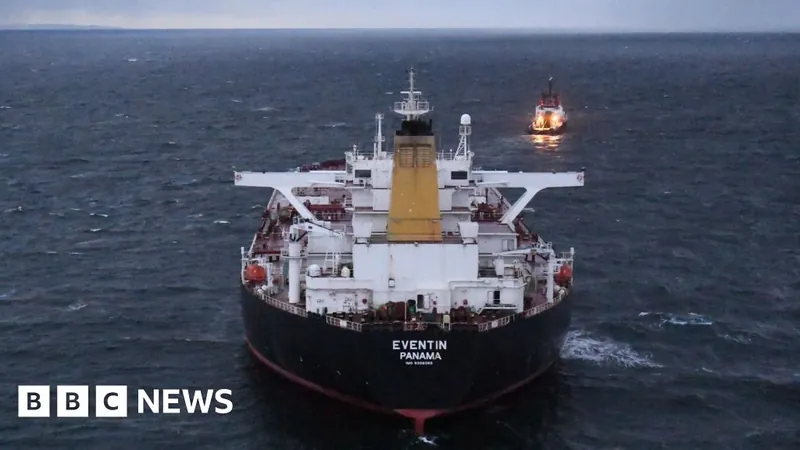
Germany's Discovery: A Russian 'Shadow' Oil Tanker Stranded in the Baltic Sea
2025-01-12
Author: Ling
Overview of the Incident
In a concerning development, German authorities have announced that a stranded oil tanker in the Baltic Sea is part of Russia's so-called "shadow fleet," a group of vessels allegedly used to circumvent international sanctions following Russia’s invasion of Ukraine. The Panamanian-flagged vessel, named *Eventin*, is now drifting in German waters after losing both power and steering abilities, prompting the deployment of tugboats to secure the ship.
German Response and Accusations
German Foreign Minister Annalena Baerbock has squarely blamed the Kremlin, accusing President Vladimir Putin of "circumventing" sanctions and jeopardizing European security by deploying "a fleet of rusty tankers." Despite these claims, Russian officials have yet to respond to the incident, a pattern consistent with their previous silence regarding accusations of utilizing shadow fleets.
International Sanctions and Implications
The United States, United Kingdom, and European Union have implemented stringent sanctions targeting Russia's oil industry since the full-scale invasion of Ukraine in February 2022. Reports indicate that *Eventin*, measuring 274 meters long and carrying approximately 99,000 tonnes of oil, was observed drifting slowly north of the German island of Rügen, navigating through an area currently experiencing tumultuous seas and wind gusts.
Crisis Management Efforts
Efforts to manage the crisis saw a specialized team of four deployed via helicopter to establish a towing connection, which was secured before three tugboats began taking control of the stranded vessel. German maritime authorities confirmed on Friday night that, as of now, there are no reports of oil leaks from the tanker.
Towing and Maritime Challenges
In their latest update, authorities indicated that the towing convoy was en route to Sassnitz, a town on Rügen, where it was expected to arrive early Sunday. The tugboats were progressing slowly at about 2.5 km per hour, under challenging conditions with waves reaching heights of 2.5 meters.
The Shadow Fleet's Complexity
The *Eventin* does not bear a Russian flag; it raises the Panamanian flag, emphasizing the complexities surrounding the shadow fleet's operations. Baerbock reiterated the continuous threats posed by Russia, not only through military aggression but through actions targeting European infrastructure, as seen in recent incidents of severed undersea cables and disinformation campaigns.
EU’s Stance on Maritime Security
The European Union has acknowledged the potential dangers emanating from this shadow fleet in a statement last December, unveiling intentions to impose further sanctions aimed at protecting maritime security and the environment while curbing funding for the war in Ukraine.
Kremlin's Adaptation to Sanctions
Since the implementation of stricter measures designed to impede Russia's oil revenue, the Kremlin has relied heavily on aged ships whose ownership is often obscured. The Atlantic Council, a prominent American think tank, describes this shadow fleet as comprising vessels that operate outside standard insurance practices and maritime regulations, frequently altering their names and registered flags to evade scrutiny.
U.S. and U.K. Sanctions
Amid these events, the U.S. and U.K. have joined forces to impose direct sanctions on Russian energy giants Gazprom Neft and Surgutneftegas. UK Foreign Secretary David Lammy emphasized that actions against these companies would "drain Russia's war chest," aiming to redirect funds away from Putin and ultimately save Ukrainian lives. Gazprom Neft, however, has denounced the sanctions as “baseless” and “illegitimate,” a claim echoed by Russian state news outlets.
Conclusion and Geopolitical Implications
On the same day, the U.S. Department of the Treasury announced sanctions on 183 vessels linked to the shadow fleet, underlining the determination of Western nations to disrupt Russia’s oil exports further and combat the ongoing threat to European security. As tensions mount and the situation unfolds, the implications of this incident could resonate beyond maritime concerns, potentially influencing the geopolitical landscape amid the ongoing conflict in Ukraine.


 Brasil (PT)
Brasil (PT)
 Canada (EN)
Canada (EN)
 Chile (ES)
Chile (ES)
 Česko (CS)
Česko (CS)
 대한민국 (KO)
대한민국 (KO)
 España (ES)
España (ES)
 France (FR)
France (FR)
 Hong Kong (EN)
Hong Kong (EN)
 Italia (IT)
Italia (IT)
 日本 (JA)
日本 (JA)
 Magyarország (HU)
Magyarország (HU)
 Norge (NO)
Norge (NO)
 Polska (PL)
Polska (PL)
 Schweiz (DE)
Schweiz (DE)
 Singapore (EN)
Singapore (EN)
 Sverige (SV)
Sverige (SV)
 Suomi (FI)
Suomi (FI)
 Türkiye (TR)
Türkiye (TR)
 الإمارات العربية المتحدة (AR)
الإمارات العربية المتحدة (AR)